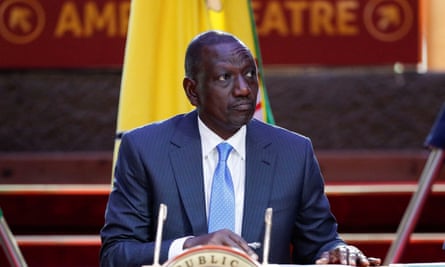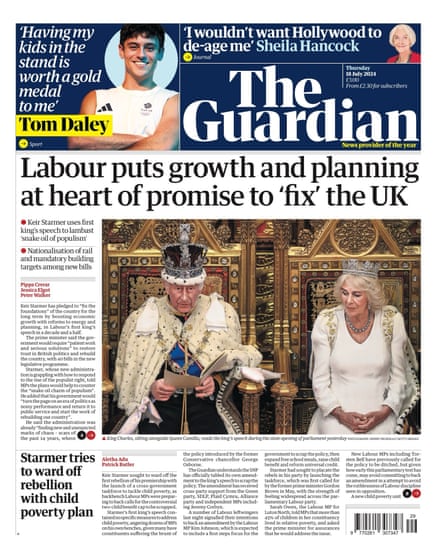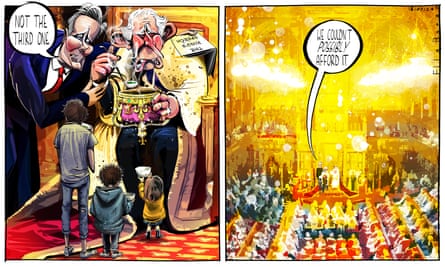Good morning.
Anti-government protests are expected to escalate in Kenya after a month of demonstrations that erupted again across the country on Tuesday calling for the president, William Ruto, to resign. In response to police hostility, protesters set fires, threw stones and chanted “Ruto must go” and “Stop killing us”. The demonstrations were met with police firing teargas and water cannon at those involved and the press. One man was shot dead and his body carried through the streets to a nearby police station.
The political unrest began in response to tax hikes in the government’s 2024 finance bill. At least 39 protesters were killed in the initial protests, hundreds more were injured and arbitrarily detained and dozens abducted by government agencies as part of a brutal police crackdown. Ruto has since U-turned on his finance proposals and fired most of his cabinet after people stormed parliament buildings and set some of the site on fire. But the protests have re-erupted as the public demands a wider government overhaul.
The largely youth-led, leaderless movement was mobilised on social media where activists have been spreading information to galvanise the public.
For today’s newsletter, I spoke with Caroline Kimeu, the Guardian’s east Africa global development correspondent based in Nairobi, about what is behind public anger in Kenya. That’s right after the headlines.
Five big stories
-
King’s speech | Keir Starmer has set out a government agenda that he claims can counter the “snake oil charm of populism” in a king’s speech pledging change to people’s lives including rights at work, cheaper energy and secure housing.
-
Israel-Gaza war | The US military-built pier for carrying humanitarian aid to Gaza will be dismantled and brought home, ending a mission that has been fraught with repeated weather and security problems that limited how much food and other supplies could get to starving Palestinians.
-
Europe | Labour’s proposed foreign policy and security pact with the EU sounds “quite promising”, the head of the European parliament’s foreign affairs committee has said, adding that the British government should use the next weeks and months to come up with proposals that are “as concrete as possible”.
-
US election 2024 | JD Vance formally accepted the Republican vice-presidential nomination on Wednesday with a deliberate, and at times divisive, pitch to re-elect Donald Trump in November.
-
Environment | The Labour government must oversee a massive ramping up of renewable energy generation in this parliament or the UK will breach its international obligations under the Paris agreement, the government’s climate watchdog has said.
In depth: ‘The political class is under more pressure than I’ve seen in a very long time’

The 2024 finance bill’s $2.7bn tax increase included hikes on sanitary towels, digital content, car ownership, and basics like oil and bread, in a country already grappling with a particularly painful cost of living crisis. Ruto has introduced a number of unpopular taxes since the start of his tenure in 2022, in order to drastically reduce the country’s nearly $80bn national debt.
Initially, Ruto pushed forward with the bill, saying it was necessary to manage the debt and provide key public services, likely expecting the opposition to subside. “Politicians downplayed it as young ‘Uber-taking, KFC-eating, bottled-water-drinking’ Kenyans who are out of touch with real problems and so I think they didn’t anticipate that the discontent would trigger such a massive turnout,” Caroline says.
As the uproar escalated Ruto (above) eventually conceded, dropping some of the most controversial elements and eventually withdrawing the bill. He also apologised for police brutality at some of the protests.
The global context
When the government announced the finance bill, critics began turning their attention to the International Monetary Fund (IMF), which has been seen as the driving force behind Ruto’s now withdrawn plans.
Two weeks before the protests started, the Kenyan government and the IMF had a meeting where they agreed the government would increase taxes, reduce subsidies and cut government waste – in effect austerity measures – as conditions to access the IMF’s $3.9bn loan. Kenya’s national debt has ballooned over the years and interest payments have taken up 38% of annual revenues according to the World Bank.
“People feel that the president is very keen on prioritising the country’s international image and relations, especially with the US, over national priorities,” Caroline adds.
This unpopular move came at a time when Kenya’s government had agreed to send police on a controversial mission to Haiti to help quell its security crisis. Caroline says, “ultimately the feeling is: why are we bending over backward to meet foreign needs over pressing national concerns?”
The second round of protests

While the tax hikes were the trigger for the initial protests, it has opened the lid on a whole host of other issues. To many, concessions came too late and did not go far enough.
Previous protests have been led by political parties and key figures but these demonstrations are largely leaderless and organised predominately online by Kenya’s huge youth population – the country’s median age is under 20. People have flooded the streets in what has been described as an organic display of discontent. The demonstrators are diverse, cutting across class lines, tribes and religious affiliations, and even mobilising previously politically inactive people.
The mood on the ground is one of “frustration and anger,” Caroline says, and is growing increasingly tense as people are ready to put themselves in harm’s way to make their demands and discontent clear. The increasing disconnect between the lavish lifestyles of politicians who “carry around wads of cash, drive expensive cars and live in big estates” and the general population who are struggling, has only exacerbated the anger.
One protester told Africa Uncensored: “We are already dying at home, so by going to the streets at least there’s a chance for us to live a dignified life.”
There is a total lack of faith in leaders, especially Ruto. “People question whether or not his priorities are in the right place,” Caroline says, “and are wondering if the pledges that were made during the height of these protests will be achieved without continued pressure.”
The anger also goes beyond Ruto, as there is an underlying desire for an overhaul of the governance of Kenya which many feel “has not catered to public interests since the country gained independence [from the UK] in 1963”.
What’s next
Ruto likely feels that he has already over extended himself by conceding to protesters, creating an independent audit taskforce and dismissing his entire cabinet in order to set up a broad-based government. But he remains in a precarious position with his future in office in jeopardy, as he loses support across the country, even in places that were formerly strongholds.
If the violence spirals and there is a continued crackdown on demonstrations, “the protests could sink the country into anarchy – we’ve been there before,” Caroline says. But this movement is different and there is hope that it could move the country away from the decades of poor governance and corruption it has endured. “The political class right now is under more pressure than I’ve seen them in a very long time – people are scrutinising every move and are demanding concrete action.”
after newsletter promotion
What else we’ve been reading

-
Like Sex Education? Then you’ll love the novel Big Swiss. Anita Chaudhuri offers up a pairing menu of great TV shows and their literary cousins in a list of bingeable books to read this summer. Craille Maguire Gillies, newsletters team
-
After Kyle Gass’s ill-considered joke about Donald Trump’s assassination, his band have halted their tour. Brian Logan examines the fallout of bad jokes that have upturned careers. Nimo
-
Surely inveterate gamer Keza MacDonald isn’t the only one feeling subscription creep as more and more forms of entertainment invent add-on fees. In this week’s Pushing Buttons newsletter, Keza writes about needing a spreadsheet just to keep track of all her game subscription services. (Subscribe to her free video games newsletter here.) Craille
-
Ester Mbathera looks at houses being built from mushrooms and weeds in Namibia as a sustainable response to the country’s housing shortage. Nimo
-
“Our information ecosystem is actually pretty good while the dust is up. But the second it begins to settle, that same system creates chaos.” So writes the Atlantic’s Charlie Warzel in a clarifying analysis (£) about the wild conspiracy theories that arose after the failed assassination of Donald Trump, and how shock jocks, hucksters and trolls shape the narrative. Craille
Sport

Football | Chelsea have “instigated an internal disciplinary procedure” against Enzo Fernández over his involvement in chants that included racist and homophobic slurs about members of the France team. Fernández posted a video on Instagram that showed him and Argentina teammates as they celebrated their victory over Colombia in the final of the Copa América.
Cycling | Richard Carapaz, the current Olympic road race champion, won stage 17 of the Tour de France, in Superdévoluy, after catching and dropping the British rider Simon Yates on the day’s toughest climb, the Col du Noyer.
Football | Chelsea have confirmed the signing of Lucy Bronze on a two-year contract, completing the England right-back’s switch on a free transfer after the conclusion of her contract at Barcelona. Meanwhile, Manchester United’s push to beat Real Madrid to Leny Yoro’s signature received a significant boost on Wednesday with the defender set to have a medical and finalise personal terms for a proposed €62m (£52m) transfer from Lille.
The front pages

The Guardian’s page one lead today is “Labour puts growth and planning at heart of promise to ‘fix’ the UK”. The Daily Mirror calls it “Taking back control” which seems like a dig suggesting the Tories achieved Brexit but little else. “Keir’s crown jewels” is how the Metro refers to the main policies put forward. “Red revolution! Bigger state and higher spending” – that’s the Daily Express while the Times has “PM seeks deal with Europe on migrants”. The Daily Mail also uses “Red revolution” and asks “How will these new burdens on firms help growth?” – those “burdens” being workers having their rights. “Starmer unveils his Big State Britain” says the Daily Telegraph – better than the “right old state Britain” that the Conservatives bequeathed, surely? “Avanti first rail firm at risk of nationalisation” – the i picks up on a juicy detail. Top story in the Financial Times is “Starmer promises ‘decade of renewal’ with bills geared to unlocking growth”.
Today in Focus

Dodging the draft: one Ukrainian man’s story – podcast
As the war grinds on and the death toll mounts, fewer Ukrainians are volunteering to fight. And some are going to desperate lengths to avoid it.
Cartoon of the day | Ella Baron

A special offer from the Guardian Print Shop
To celebrate the first solo exhibition from multi-award-winning Guardian cartoonist Ben Jennings, Snowflake’s Progress, we’re delighted to offer 10% off for First Edition readers at the Guardian Print shop. Buy signed limited edition exhibition prints of Ben’s cartoons with the code GSUBSCRIBER10 until Saturday 20 July.
The Upside
A bit of good news to remind you that the world’s not all bad

Dover Castle in Kent was severely damaged during the civil war of 1216, with defensive walls and multiple towers destroyed. More than 800 years later, however, it has been digitally restored to its former glory, as part of an exhibition titled Dover Castle Under Siege, which opens on Monday.
The model was created by a team of English Heritage experts, among them curators, historians and a leading 3D artist. Says Paul Pattison, senior properties historian at English Heritage: “The level of detail is astonishing.”
Sign up here for a weekly roundup of The Upside, sent to you every Sunday
Bored at work?
And finally, the Guardian’s puzzles are here to keep you entertained throughout the day. Until tomorrow.
-
Quick crossword
-
Cryptic crossword
-
Wordiply
Source: theguardian.com


















